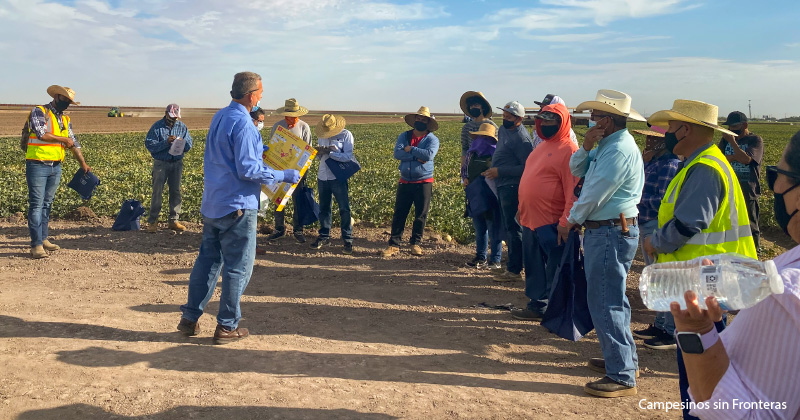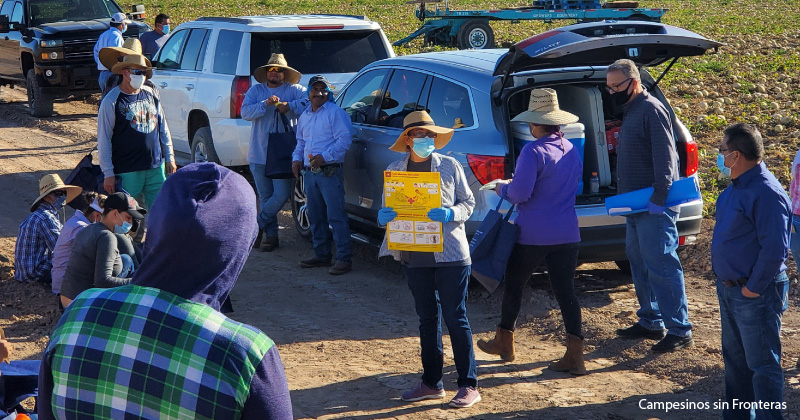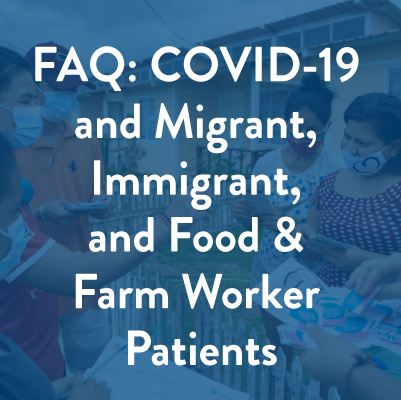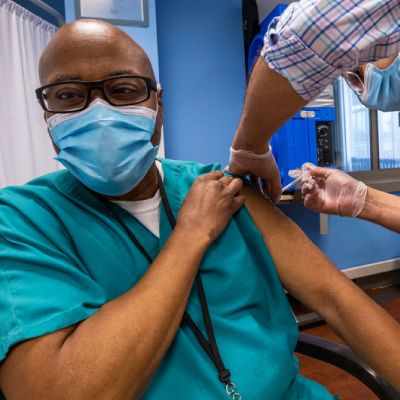- Who We Are
- Clinician Employment
- Publications
- Witness to Witness (W2W)
- Kugel & Zuroweste Health Justice Award
- Your Voice Matters: Photovoice Project
Building Capacity in Occupational Health: Campesinos Sin Fronteras and La Ventanilla de Salud de Yuma, AZ
Wed, 10/21/2020 | by MCN Admin


By Rose Guerra, Betsabe Ruiz and Idolina Castro
[Editor’s Note: As part of our celebration of Binational Health Month, we present a post from Campesinos Sin Fronteras and the Ventanilla de Salud in Yuma, Arizona. Learn more about Campesinos Sin Fronteras here. Learn about the system of Ventanillas de Salud, a project of the Mexican government to support the health of visitors to Mexican Consulates around the US, here.]
Campesinos Sin Fronteras (CSF) is a non-profit organization with the mission to promote self-sustainability for agricultural workers and people with low to moderate incomes by providing and facilitating access to health care, mental health, and social services, as well as rehabilitation, counseling, education, and job development programs.
Since 2007, CSF has successfully worked as a fiscal agent for the Ventanilla de Salud (VdS) in the Mexican Consulate in Yuma, Arizona. CSF and the Yuma VdS have a very effective collaborative relationship, as both organizations share the vision of helping the migrant community through various events like health fairs and mobile consulate services. We also have a permanent VdS within the Consulate in Yuma, AZ. At VdS, we provide early detection services for diabetes and blood pressure for timely referrals. We also have another VdS office within our CSF offices in San Luis, AZ. This time of year, during binational health month, events, presentations, and workshops focused on chronic diseases are held with recognized specialists from our community. During that week, we invite community members for orientation on prevention and health care. Our programs and services, however, support our community’s health year-round.
Learn more about the partnership of Ventanilla de Salud and Migrant Clinicians Network:
https://www.migrantclinician.org/blog/2016/jul/ventanilla-de-salud-and-migrant-clinicians-network%E2%80%99s-new-partnership.html
One new program that the CSF/VdS offered this year, in collaboration with Migrant Clinicians Network (MCN), is the health and safety training program for field workers. In February, MCN’s Alma Galván, MCH, Senior Program Manager, Environmental & Occupational Health, gave training to a group of community health workers from CSF at our office in Somerton, AZ. The objective of this training was to reinforce the capacity of CSF in occupational health issues by training community health workers to inform and educate farmworkers and their families on topics of heat stroke, chemical safety, and ergonomics. The training also aimed to give workers the tools to improve their work environment, learn what are the frequent dangers that workers face and that in many cases are not taken into account, and help them detect the warning signs in different situations within their workplace.
With an established gameplan, CSF began to work on implementation of the health and safety program, but could not foresee how the course of the world and circumstances would change our way of working and interacting with our participants, due to the COVID-19 pandemic. Our typical strategies had to be changed in order to grow and continue working and teaching our classes and continue with our training. We learned to interact in a different way than what we were used to, but we never lost sight of the mission and commitment of CSF, which is to teach and advocate for our people. Despite the unusual circumstances, we managed to continue to work toward our mission while providing a safe environment for each of our community health workers as well as for our participants.
Due to the global pandemic, we had to rethink our resources and opportunities to be able to restart our training sessions, and with the most difficult season in the region -- the very hot and lengthy summer -- approaching, we set about the task of finding how to reach our people in their own workplaces. Here is a brief overview of our work:
In June 2020, we had the opportunity to give training on heat stress to workers in the melon fields. This was important because these workers are at greater risk of suffering heat-related illnesses because of our region’s summer temperatures, which can reach up to 120F, even in the shade.
The agricultural company that allowed us to give the training asked that we start the sessions at 6:00 AM, noting that we would have to be prepared to give several training sessions at the same time in different places since the crews would be separated. Teams of four promoters prepared to train, with material for 200 people, taking copies of the evaluations, pre- and post- tests, and pens for each worker since for safety we believed it would be in their best interest to have their own pen. We provided mouth covers, Gatorade, waters and granola bars for workers to augment our training, and we also made posters with information and safety protocols pertaining to COVID-19.

On the morning of the first training, we confronted very high temperatures despite the early hour. Additionally, Yuma County had reported its highest number of COVID-19 infections since the pandemic began. Our community health workers, with great uncertainty but a lot of dedication, carried out the entire security protocol for both themselves and the agricultural workers, arriving at the melon fields at 6:00 AM with all our precautions and all the desire and enthusiasm to begin our training.
After experiencing some emotions and setbacks, and seeing that the subsequent training could be carried out successfully as long as the company remained amenable, we decided to continue with the training as soon as possible.
In our search to continue innovating and doing our work with the desire and passion that defines us despite the pandemic, we reached out to one of our support groups for housekeepers via Zoom. We had learned that people were suffering from poisonings from mixing chemicals while staying at home during the pandemic, so we looked at giving a training to give more information on the subject. A group of community health workers were able to virtually train a total of 15 people on the topic of chemical safety, looking at the need of people and safety due to the pandemic and the distance in which they are living.
In September, we conducted 60 impact evaluations three months after the last training over the phone. We had an excellent response from participants, who emphasized the importance of knowing about heat-related illnesses and the precautionary measures that we all must take, as well as what to do in case of an emergency.
In total, we reached 226 workers and community members through our team of nine community health workers. We followed up our work three months later, collecting 60 impact evaluations. Despite the critical situation due to COVID-19, CSF was able to carry out the work by relying on its previously built knowledge and relationship with the community and local agricultural companies, who trust us to follow CDC-recommended safety protocols.
As community health workers are essential workers, we recognized that we must efficiently direct our time, focusing on where we are needed the most. In this case, agricultural workers needed education and training as essential workers working through the pandemic while battling additional health risks like extreme heat. This occupational health program allowed us to see the risks to which workers in the field are exposed not only in the summer, but all year round, and even more so during the pandemic. It also allowed us to seek, find, and innovate new ways to help farmers as well as agricultural workers in the best possible way to continue the mission of CSF, which is educating and advocating for families with low and moderate resources. We thank MCN and VdS for the opportunity to reach so many families in our community by providing the information and resources to reach each one of them.
Like what you see? Amplify our collective voice with a contribution.
Got some good news to share? Contact us on our social media pages above.
Return to the main blog page or sign up for blog updates here.







